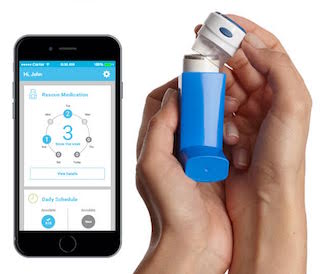 Propeller Health’s connected inhaler technology helped to reduce usage of a rescue inhaler in a recent study of 495 asthma patients conducted at Dignity Health.
Propeller Health’s connected inhaler technology helped to reduce usage of a rescue inhaler in a recent study of 495 asthma patients conducted at Dignity Health.
“The research demonstrates that the benefits of telehealth go beyond monitoring medication adherence, but can also identify patterns of risk and impairment. This additional information may allow more timely interventions and enhanced asthma management,” Dr. Rajan Merchant, the principal study investigator and physician at Dignity Health’s Woodland Clinic Medical Group said in a statement. “Although additional study efforts are needed, digital health is promising to help improve care and asthma control.”
Patients were split into a routine care group and an experimental group. Both had Propeller sensors affixed to their short-acting beta antagonist (SABA) inhalers, which is a rescue inhaler used only when the patient’s asthma becomes exacerbated, but for the routine care group, neither the patient nor their provider had access to the data from the sensor, whereas the intervention group received feedback about where and when they were using the inhaler. The study lasted a full year, to account for seasonal variations in symptoms.
At the end of the study period, both groups had decreased their SABA use and increased their number of SABA-free days, but the intervention group had done so by a significantly larger margin. The study also looked at asthma control at the end of the study, as measured by the asthma control test. For patients whose asthma was well controlled at the start of the study, there was no difference between the two groups. But for patients who began the study uncontrolled, they were more likely to improve with access to the Propeller data.
In an exit survey, 59 percent of the intervention group said they had learned about a new asthma trigger as a result of using the technology.
“We are very pleased with the growing body of data that supports the effectiveness of our asthma platform,” David Van Sickle, CEO of Propeller Health, said in a statement. “Our partnership with Dignity Health is important as we continue to advance innovation in chronic respiratory disease management and improve patients’ quality of life.”
Researchers noted that more participants dropped from the study than expected, perhaps due to syncing and battery life issues with the technology, which have been corrected in new releases since the trial began in 2012. They also noted the existence of the Hawthorne Effect, wherein patients who know they’re being observed are sometimes more adherent.




















